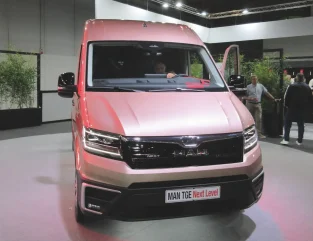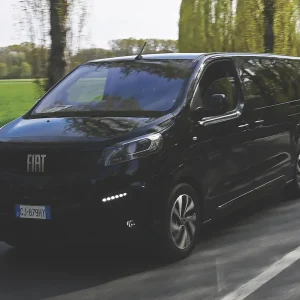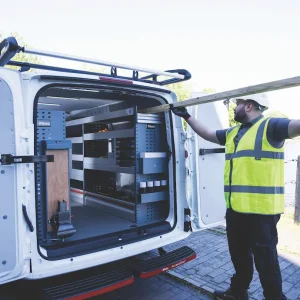
Truck maker MAN is determined to boost international registrations of its VW Crafter-derived TGE light commercial, according to global head of van sales (and former UK vans boss) Daniel Holbein.
“We aim to sell 30,000 this year, up from over 26,600 in 2023 and from just 2,000 back in 2017,” he said. “While there are still some challenges with the delivery of components, the supply of vehicles is back on track, and availability is good.”
Holbein was speaking at the worldwide launch of the latest version of TGE at the Transpotec Logitec transport show in Milan, Italy. Referred to by MAN as the TGE Next Level, it boasts a host of new and revised driver assistance systems, many of which are fitted as standard, including Fatigue Detection, Traffic Sign Information, and Intelligent Speed Assist.
All TGEs grossing at above 3.5t come with new Blind Spot Warning and Drive Off Warning devices as standard. The former uses radar sensors to alert drivers to the presence of cyclists who might not otherwise be spotted. The latter employs a camera and radar to monitor the area in front of the vehicle and warn drivers if a cyclist or pedestrian is in the danger zone before they pull away – necessary on a truck, perhaps, but far less of a requirement on a van.
The dashboard has been redesigned with digital instrumentation and a large touchscreen that controls many of the vehicle’s functions and the infotainment package. New to the TGE as standard features are keyless ignition and an electronic parking brake.
The 2.0-litre diesel and the choice of a manual or an eight-speed automatic transmission remain, but the 102hp variant has been dropped across all markets due to lack of demand. Customers get the choice of 140hp, 163hp or 177hp versions instead.
Waiting for EV
What customers do not get, however, is the choice of a factory-built electric TGE Next Level. On the face of it that puts the newcomer at a serious disadvantage against rivals such as Ford’s E-Transit, but Holbein disagreed.
“The market isn’t going electric as quickly as we thought it would two years ago,” he observed. “If anything, demand for electric models is slowing down.”
Many operators are wary of going electric because of the shortcomings of the charging infrastructure, he said. Improvements will need to be made before attitudes change.
“I think the market will eventually turn to electric models,” Holbein said. “The question is when.”
An electric TGE looks unlikely to appear until 2028 when VW is scheduled to introduce an all-electric Crafter based on its SSP Platform.
The outgoing TGE was sold in electric guise but primarily in left-hand-drive markets. The right-hand-drive eTGEs that appeared on this side of the Channel were one-off special conversions for parcels giant DPD.
In the meantime, operators who want to minimise their environmental impact can run their diesel TGE Next Levels on HVO – hydrotreated vegetable oil – said Holbein. Synthesised from renewable raw materials such as used cooking oil, it delivers an 85% well-to-wheel CO2 reduction because of the way it is produced. It costs 10% per litre more than standard diesel, however, and while a handful of truck stops stock it, any business that wants to switch to HVO would need to store it in its own bulk tank.
While a new electric TGE could appear in four years’ time, one powered by a fuel cell is a long way off, said Holbein, if it ever appears at all.
“As things stand the technology costs too much and it’s too complex,” he argued. “Maybe in 2035?”
He was more optimistic about the arrival of self-driving TGEs, however, possibly as people carriers in urban areas. MAN has recently started trialling autonomous trucks on German motorways.
TGE Next Level has enhanced cybersecurity in line with tougher European regulatory requirements, said Holbein, to prevent its sophisticated onboard systems from being hacked. Without it, criminals could take control of a van, bring it to a halt, then steal both the vehicle and its cargo. Loads such as pharmaceuticals could be at particular risk.
The first TGEs should arrive with UK customers in late July/early August. Over 3,000 were sold here in 2023 with a target of 3,800 for this year.





